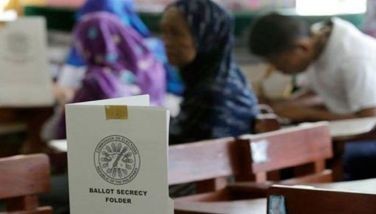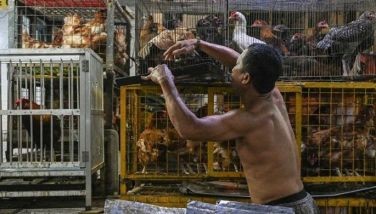GMA plays Santa to distraught
December 30, 2002 | 12:00am
LA TRINIDAD, Benguet – Like Santa Claus, President Arroyo gifted yesterday Cordillera vegetable farmers at the La Trinidad trading post with the assurance that the government will continue with its drive against vegetable smuggling.
Speaking in fluent Iluko, Mrs. Arroyo promised hundreds of vegetable dealers that the government will fight the entry of imported vegetables into the country.
She cited as an example last Friday’s seizure of P6 million worth of smuggled vegetables from China by the anti-smuggling task force led by the Presidential Security Group.
The confiscated vegetables were loaded in a 40-foot container van that arrived from China in late November aboard the cargo vessel Hunsa Bhum. The container van was allegedly consigned to Golden Crops Merchandising but did not have the necessary import permits from the Department of Agriculture.
When the President arrived with the First Family here Thursday night, she immediately met with Gov. Raul Molintas and other officials of the Benguet Vegetable Commission.
She vowed that Task Force Blue Collar, the government’s newly created anti-smuggling task force, will be allowed by the Bureau of Customs to inspect all container vans at the Manila port.
Mrs. Arroyo said the task force has thus far seized 57 container vans loaded with smuggled vegetables. They were later condemned, following the government’s new redemption policy on smuggled vegetables.
The previous redemption policy allowed the government to auction the confiscated smuggled vegetables at a lower price, but this resulted in the flooding of local markets with cheaper imported vegetables.
The President has also rejected proposals to lower the tariffs imposed on imported vegetables entering the country. She said denying lower tariffs on these produce is in line with her administration’s efforts to promote and protect the local vegetable industry, particularly the Benguet farmers.
These farmers claimed to have incurred millions of pesos in losses due to the entry of imported vegetables, the bulk of which are smuggled.
Molintas, the head of the Benguet Vegetable Commission, hailed Mrs. Arroyo’s support for the vegetable farmers, saying that "policies now being implemented will be of great help to Benguet farmers and I know that our farmers now have faith in her government. Of course they will certainly support her government in reciprocity of her support to them." He also said that an P8-million vegetable cold storage plant will be built in La Trinidad. The President handed him a P4-million check as her counterpart funding for the project, while La Trinidad town and Benguet province will contribute P2 million each.
Molintas is optimistic that the Cordillera vegetable industry will recover from its losses as markets have opened up again — traders from Bicol have again started buying their supplies from La Trinidad.
On the other hand, the President’s visit to a strawberry farm in this town jacked up the price of this fruit. From P90 per kilo for mixed-size packs to P120 per kilo for the large "selection" berries, prices reached an average of P150 per kilo by the time she left, trailed by a convoy of more than 20 vehicles.
Strawberries were sold to Mrs. Arroyo’s entourage for P150 to P200 a kilo, including the basket. Malacañang staff reserved 40 baskets.
The President did not pick any strawberries, to the dismay of press photographers who converged on the 400-square meter "garden" planted by Victor and Tessie Compas. Her family, however, collected some 8.5 kilos of strawberries before Malacañang staff moved in to fill the 40 baskets they reserved.
When the President left, Manang Tessie told The STAR she was wondering who would pay for the strawberries collected by the First Family. She was later approached by Palace staff.
Manang Tessie said that strawberries can go for as low as P50 per kilo on rainy days or when no tourists come to buy. These fruits can be priced for as much as P250 per kilo on weekends.
Strawberries easily get molds when rained on, or when fog settles in the valley. Prices start to go down by February, one of the coldest months of the year in Cordillera, when the weather is conducive to the growth of molds.
The strawberry farm visited by the President is a part of 23 hectares owned by Benguet State University, which leases it out to farmers at P5,000 per year for every 500 square meters.
The Compases are said to be relatives of Ann Bistoyong-Rosquita, who mans the Presidential Summer Mansion here.
Meanwhile, the President’s security of land tenure program has benefited 657,609 families in urban and rural areas since she assumed office in January 2001.
The program gave families the opportunity to own land on which to build a home.
Close to 40 proclamations, executive orders and memoranda were issued by the President, declaring parcels of public or government land as alienable and disposable for socialized housing.
A total of 344.61 hectares were allotted for the poor in the National Capital Region (NCR), while 21,993.63 hectares were allotted for the poor in other areas of the country.
In the NCR, 54,260 families have benefited from the socialized housing program, while 603,349 families from all over the country were also granted socialized housing.
The President recently declared housing as one of the eight-point work programs she will focus on in 2003.
Mrs. Arroyo, in a statement, said she never fails to recall that during her visits to the countryside, even as Vice President, that she often asked the people what they wanted most out of life. The common answer would be "pabahay."
She added that while her administration’s target for housing for the urban poor has been satisfactorily met, there is still much to be done. — Artemio Dumlao, Aurora Alambra
Speaking in fluent Iluko, Mrs. Arroyo promised hundreds of vegetable dealers that the government will fight the entry of imported vegetables into the country.
She cited as an example last Friday’s seizure of P6 million worth of smuggled vegetables from China by the anti-smuggling task force led by the Presidential Security Group.
The confiscated vegetables were loaded in a 40-foot container van that arrived from China in late November aboard the cargo vessel Hunsa Bhum. The container van was allegedly consigned to Golden Crops Merchandising but did not have the necessary import permits from the Department of Agriculture.
When the President arrived with the First Family here Thursday night, she immediately met with Gov. Raul Molintas and other officials of the Benguet Vegetable Commission.
She vowed that Task Force Blue Collar, the government’s newly created anti-smuggling task force, will be allowed by the Bureau of Customs to inspect all container vans at the Manila port.
Mrs. Arroyo said the task force has thus far seized 57 container vans loaded with smuggled vegetables. They were later condemned, following the government’s new redemption policy on smuggled vegetables.
The previous redemption policy allowed the government to auction the confiscated smuggled vegetables at a lower price, but this resulted in the flooding of local markets with cheaper imported vegetables.
The President has also rejected proposals to lower the tariffs imposed on imported vegetables entering the country. She said denying lower tariffs on these produce is in line with her administration’s efforts to promote and protect the local vegetable industry, particularly the Benguet farmers.
These farmers claimed to have incurred millions of pesos in losses due to the entry of imported vegetables, the bulk of which are smuggled.
Molintas, the head of the Benguet Vegetable Commission, hailed Mrs. Arroyo’s support for the vegetable farmers, saying that "policies now being implemented will be of great help to Benguet farmers and I know that our farmers now have faith in her government. Of course they will certainly support her government in reciprocity of her support to them." He also said that an P8-million vegetable cold storage plant will be built in La Trinidad. The President handed him a P4-million check as her counterpart funding for the project, while La Trinidad town and Benguet province will contribute P2 million each.
Molintas is optimistic that the Cordillera vegetable industry will recover from its losses as markets have opened up again — traders from Bicol have again started buying their supplies from La Trinidad.
On the other hand, the President’s visit to a strawberry farm in this town jacked up the price of this fruit. From P90 per kilo for mixed-size packs to P120 per kilo for the large "selection" berries, prices reached an average of P150 per kilo by the time she left, trailed by a convoy of more than 20 vehicles.
Strawberries were sold to Mrs. Arroyo’s entourage for P150 to P200 a kilo, including the basket. Malacañang staff reserved 40 baskets.
The President did not pick any strawberries, to the dismay of press photographers who converged on the 400-square meter "garden" planted by Victor and Tessie Compas. Her family, however, collected some 8.5 kilos of strawberries before Malacañang staff moved in to fill the 40 baskets they reserved.
When the President left, Manang Tessie told The STAR she was wondering who would pay for the strawberries collected by the First Family. She was later approached by Palace staff.
Manang Tessie said that strawberries can go for as low as P50 per kilo on rainy days or when no tourists come to buy. These fruits can be priced for as much as P250 per kilo on weekends.
Strawberries easily get molds when rained on, or when fog settles in the valley. Prices start to go down by February, one of the coldest months of the year in Cordillera, when the weather is conducive to the growth of molds.
The strawberry farm visited by the President is a part of 23 hectares owned by Benguet State University, which leases it out to farmers at P5,000 per year for every 500 square meters.
The Compases are said to be relatives of Ann Bistoyong-Rosquita, who mans the Presidential Summer Mansion here.
Meanwhile, the President’s security of land tenure program has benefited 657,609 families in urban and rural areas since she assumed office in January 2001.
The program gave families the opportunity to own land on which to build a home.
Close to 40 proclamations, executive orders and memoranda were issued by the President, declaring parcels of public or government land as alienable and disposable for socialized housing.
A total of 344.61 hectares were allotted for the poor in the National Capital Region (NCR), while 21,993.63 hectares were allotted for the poor in other areas of the country.
In the NCR, 54,260 families have benefited from the socialized housing program, while 603,349 families from all over the country were also granted socialized housing.
The President recently declared housing as one of the eight-point work programs she will focus on in 2003.
Mrs. Arroyo, in a statement, said she never fails to recall that during her visits to the countryside, even as Vice President, that she often asked the people what they wanted most out of life. The common answer would be "pabahay."
She added that while her administration’s target for housing for the urban poor has been satisfactorily met, there is still much to be done. — Artemio Dumlao, Aurora Alambra
BrandSpace Articles
<
>
- Latest
- Trending
Trending
Latest
Trending
Latest
Recommended
































